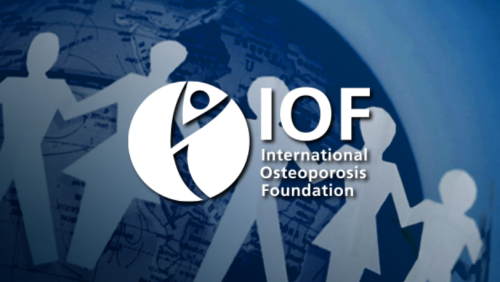LATEST NEWS
- All news
-
43Awards
-
9Burden of Osteoporosis
-
80Capture the Fracture
-
1Exercise
-
1FRAX
-
87IOF
-
35IOF Positions and Statements
-
1IOF Tour Latin America
-
21Meetings
-
78Member News
-
9Nutrition
-
39Policy
-
6Prevention
-
52Research
-
32Scientific Journals
-
14Skeletal Rare Diseases
-
9Training Courses
-
17Treatment
-
32World Osteoporosis Day
- News room - Latin America Region

The International Osteoporosis Foundation (IOF) has released a position paper reflecting an IOF Commission’s findings to recommend rules of partnerships with member organizations and scientists operating in countries involved in armed conflicts. The Commission, comprising IOF representatives from all IOF regions and diverse backgrounds, conducted research and surveyed member organizations, culminating in recommendations adopted unanimously by the IOF Board in April 2024.
Dr Philippe Halbout, CEO of IOF, stated, “IOF is a truly international organization comprising the Committee of National Societies with more than 335 member societies from 152 countries/territories, and the Committee of Scientific Advisors with 168 individual members, in all regions of the world. The Commission’s position, developed following extensive consultation with our membership, emphasizes the Foundation’s commitment to upholding scientific neutrality and global collaboration to benefit patient care and public health globally, even in times of conflict.”
Key Conclusions and Recommendations
Armed conflict
- The Commission recommends that IOF condemns all armed conflict since it adversely affects health irrespective of perception of aggressor or defender.
Committee of National Societies (CNS)
- The Commission recommends, with the proviso below, that IOF does not expel member Societies whose countries are involved in armed conflict.
- The Commission recommends that IOF boycotts societies complicit in crimes against humanity and when the collusion of the Society is clear.
- The Commission recommends that IOF does not refuse CNS membership on the basis that their country is involved in armed conflict.
Committee of Scientific Advisors (CSA) and Board of Trustees
- The Commission recommends that IOF does not ordinarily expel scientific advisors whose countries are involved in armed conflict.
- The Commission recommends that IOF does not ordinarily expel Board members whose countries are involved in armed conflict.
IOF Journals
- The Commission recommends that IOF upholds the position of the Committee of Publication Ethics that decisions to edit and publish should not be determined by the policies of governments or other agencies outside of the journal itself.
- The Commission recommends that the journals of IOF do not ordinarily refuse scientific papers because their country of origin is involved in armed conflict.
- The Commission recommends that the journals of IOF do not ordinarily expel members of the editorial board because their country of origin is involved in armed conflict.
- The Commission recommends that the journals of IOF do not ordinarily ban reviewers of scientific papers because their country of origin is involved in armed conflict.
- The Commission recommends that the journals of IOF do not ordinarily ban the appointment of scientific reviewers or membership of the Editorial Boards because their country of origin is involved in armed conflict.
The IOF's position is supported by a majority of its member societies, as indicated by the survey findings which revealed a strong consensus towards maintaining a neutral stance and avoiding actions that could negatively impact scientific progress and patient care. The survey of IOF member societies, held between September 2023 and January 2024, resulted in responses from 51 member societies from all six IOF world regions and included societies from many territories in armed conflict including Israel, Palestine, Syria and Ukraine.
Professor John A. Kanis, IOF Honorary President and Co-Chair of the Commission, stated, “The Commission’s position, unanimously approved by the Board of IOF, is that scientific collaboration and the pursuit of knowledge should not be hindered by geopolitical conflicts. Worldwide, one in three women and one in five men over age 50 will experience osteoporosis fractures that too often lead to long-term disability and early death. This underscores the critical importance of maintaining open channels for research and collaboration, essential for advancing global public health and well-being as well as our collective efforts to tackle osteoporosis.”
###
Reference: Kanis, J.A., Dawson-Hughes, B., Campusano, C. et al. IOF position on scientists and societies operating in conflict zones. Osteoporos Int (2024). https://doi.org/10.1007/s00198-024-07129-x
Position statement and survey questions available on the IOF website
About IOF
The International Osteoporosis Foundation (IOF) is the world's largest nongovernmental organization dedicated to the prevention, diagnosis and treatment of osteoporosis and related musculoskeletal diseases. IOF members, including committees of scientific researchers as well as more than 335 patient, medical and research organizations, work together to make fracture prevention and healthy mobility a worldwide healthcare priority.
https://www.osteoporosis.foundation @iofbonehealth